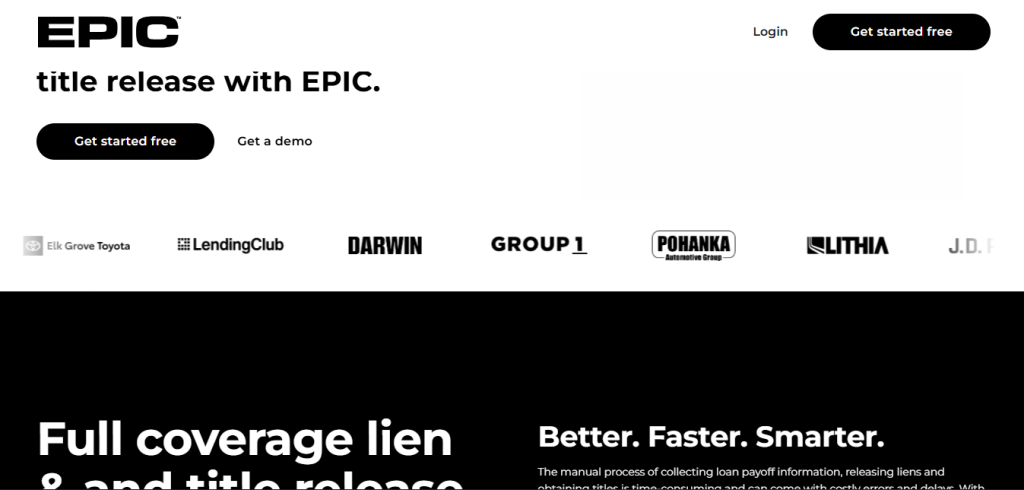EPIC Raises $10 Million Series A to Streamline Automotive Title Transfers Through Intelligent Automation
November 8, 2025
byFenoms Startup Research

EPIC, a U.S.-based fintech innovator modernizing automotive title and loan payoff systems, has raised $10 million in Series A funding led by FM Capital and Automotive Ventures, alongside other strategic investors.
Founded by Brandon Hall, EPIC is solving one of the automotive industry’s most outdated and friction-filled processes - title transfers. Its automation platform digitizes the exchange between lenders, dealers, and consumers, turning a slow, paperwork-heavy workflow into a real-time digital process that is faster, more secure, and transparent.
Transforming the Hidden Backbone of Automotive Finance
In the complex web of vehicle ownership, title transfer remains one of the last manual processes yet to be streamlined. After loan payoff, dealerships, lenders, and DMVs navigate fragmented systems that often take weeks to complete a single transaction. Errors, delays, and miscommunication add cost and frustration for all parties involved.
EPIC’s platform replaces that friction with an automated, compliance-ready network that processes payoffs and releases titles instantly - cutting down turnaround times from weeks to mere hours.
“We built EPIC to bring speed, clarity, and trust to a system that touches millions of transactions a year,” said Brandon Hall, Founder and CEO. “When every stakeholder - dealer, lender, and customer - can see and verify the same data in real time, you eliminate confusion and unlock efficiency.”
A $60 Billion Market Stuck in Slow Motion
The automotive fintech sector is projected to exceed $60 billion by 2030, growing at nearly 10% CAGR as dealerships and lenders rush to digitize legacy systems. Yet, title management - the critical last mile of ownership transfer - remains deeply fragmented across multiple regulatory and financial entities.
EPIC’s infrastructure tackles that blind spot by building a connective layer between financial systems, DMVs, and dealerships. The company isn’t just speeding up paperwork - it’s reprogramming how trust is formed in financial transactions.
And that’s what makes EPIC’s approach strategically profound. Many startups chase disruption by building tools that move faster; EPIC built one that moves truer. It realized that trust, not speed, is the true currency of scalability.
When you make multiple institutions - each with their own compliance, data standards, and legal frameworks - operate from a single verified source of truth, you aren’t just digitizing a process; you’re building an interoperability network.
This is where great founders separate themselves from good ones. They stop thinking about the product as the innovation and start treating the connection itself as the moat. EPIC’s brilliance lies in how it doesn’t force every player to change - it simply makes collaboration the path of least resistance.
Because in complex industries like automotive or finance, the hardest problem isn’t adoption - it’s alignment. If you can make alignment effortless, growth becomes exponential.
That’s a principle every founder can use: Build your product around reducing misalignment, not just inefficiency. Once you control the layer where different systems - or even competitors - agree, you’ve already built the infrastructure that defines the category.
EPIC didn’t just digitize title transfers; it created a neutral ground for institutions to trust one another faster. That’s what real infrastructure startups do - they quietly become the rails others can’t run without.
Backed by Automotive and Fintech Powerhouses
EPIC’s funding round was led by FM Capital, known for backing transformative mobility technologies, and Automotive Ventures, a fund specializing in innovation across the transportation ecosystem. Their combined expertise signals strong confidence in EPIC’s market position as a future-standard infrastructure provider for automotive finance.
With this capital, EPIC will deepen partnerships with lenders, dealerships, and state DMVs while scaling its API-driven architecture to handle millions of transactions per month.
The Need for Transparent Title Ecosystems
Every year, over 40 million title transfers occur in the U.S. automotive market - a trillion-dollar stream of vehicle transactions where paperwork still rules. EPIC’s technology automates verification and confirmation across lenders, enabling a fully digital payoff-to-release pipeline that ensures compliance and accountability in real time.
This isn’t just efficiency; it’s systemic transformation. By eliminating the uncertainty of when and how a title clears, EPIC gives dealerships faster inventory turnover, lenders lower operational costs, and consumers immediate peace of mind.
Founder and Vision
Brandon Hall brings a rare combination of experience in both automotive retail and fintech operations, having witnessed firsthand how fragmented workflows slow down every step of the transaction lifecycle. His vision for EPIC centers on making the invisible visible - transforming backend friction into seamless collaboration.
Hall explains, “The goal isn’t to move faster just for the sake of it. It’s to give everyone in the process confidence that the system is working perfectly in sync.”
Under his leadership, EPIC has evolved from a simple title automation tool into a mission-critical infrastructure layer for modern automotive ecosystems - connecting the traditionally disconnected.
What’s Next for EPIC
With its $10 million Series A funding, EPIC plans to expand its engineering and compliance teams, enhance its integration capabilities with major financial institutions, and roll out its Title Management API to dealers and lenders nationwide.
The company is also exploring future applications in equipment financing and other asset-heavy industries where ownership verification remains slow and manual.
As the automotive industry races toward a fully digital, transparent future, EPIC’s infrastructure could become the foundation that enables it.
Because the next era of fintech isn’t about faster clicks or prettier dashboards. It’s about creating invisible systems of trust - ones that make the world move not just quickly, but confidently.









